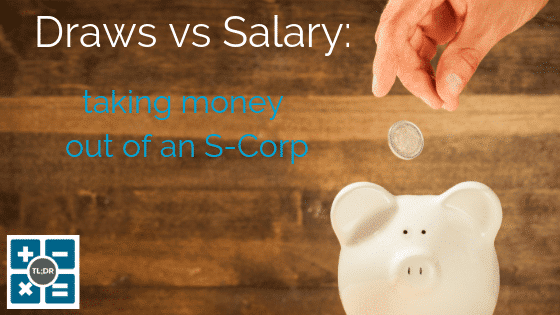When you do business in your own name as a sole proprietorship, there isn’t really such a thing as a “salary” or a “distribution.” Clients and customers pay you, you pay taxes, done and done. As long as you keep your personal and business expenses separate, ideally using separate bank accounts, you’re good.
As an S-Corporation, suddenly you have a choice to make every time money leaves the company’s “hands” and gets into yours: is it a draw or a salary?
Draws
Owner draws:
-
- Are usually either for estimated taxes, due to a specific event, or from business growth
- Are infrequent in nature: quarterly, yearly
- Reduce your basis (ownership interest) in the company because they are equity transactions on your balance sheet. This is important to note since if your basis is reduced to zero, your taxes get a bit more complicated.
- Do not trigger payroll taxes
- Can trigger penalties from your lenders if they are excessive
Officer salaries:
-
- Occur on a regular basis every payroll
- Are frequent in nature: weekly, monthly
- Do not affect your basis in the company, because they are considered a business expense
- Trigger payroll taxes. Because of this, most S-Corporation owners try to choose a low but reasonable salary
- Can trigger penalties from the IRS if your salary is considered unreasonable. If the IRS determines that you are underpaying yourself as a way to evade payroll taxes, they can take legal action.
TL;DR: Your officer pay should be reasonable. Taking owner draws should not be a daily thing, but it is perfectly normal and okay to take draws in order to pay your flow-through share of your company’s taxes. Watch your draws though: If you pull too much money from your company, you may leave it with too little cash to function, and you can also break loan covenants this way.






